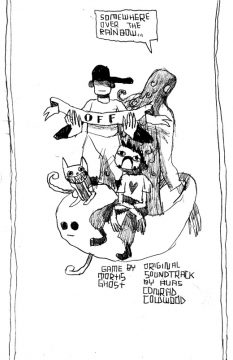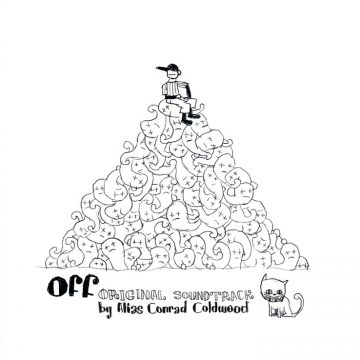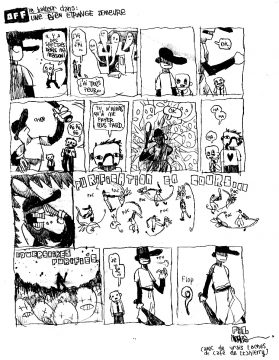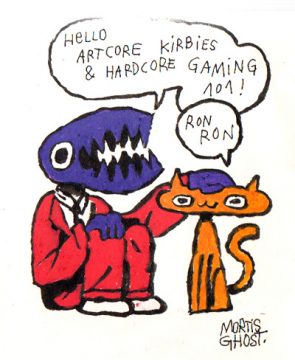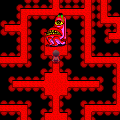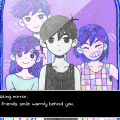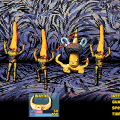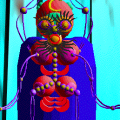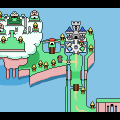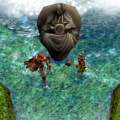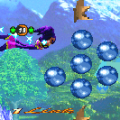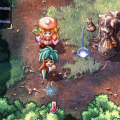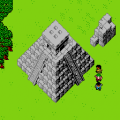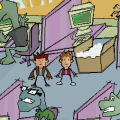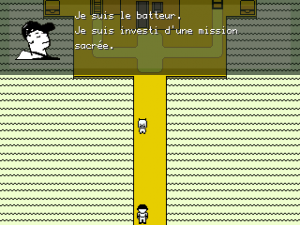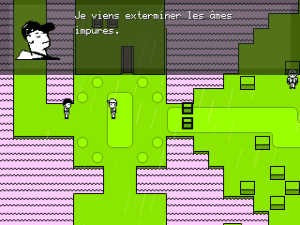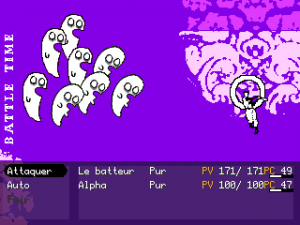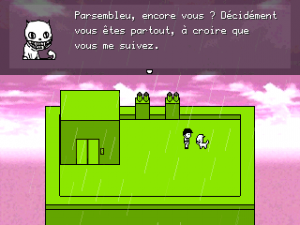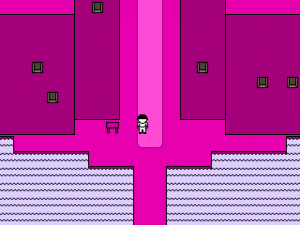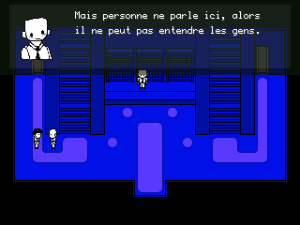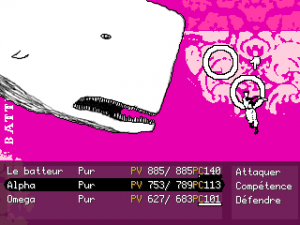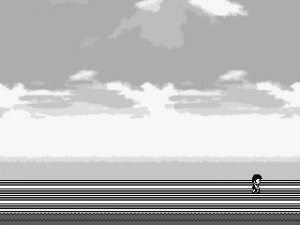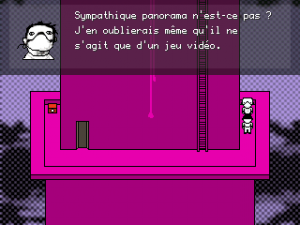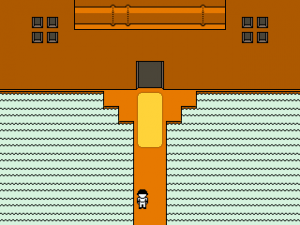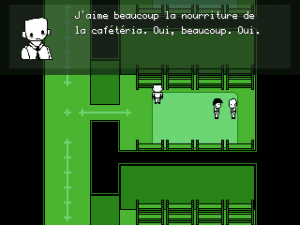Communities centered around RPG Maker used to be very active a few years ago. The French-speaking scene was no exception; some might say it was a little world in itself. It’s no surprise Enterbrain’s legendary tool attracted so many people, mainly beginners who had no knowledge of game design at all, but really wanted to make their own game. Of course, game design is difficult, so only the most determined of those makers managed to complete their projects. In spite of the flow of games that were ultimately cancelled or sometimes not even started, what could be nowadays called cult classics ended up marking their era. It’s not rare to find French gamers that didn’t really follow the development scene but know about games like Dark Soul, Aëdemphia or Mystery of Solarus nonetheless.
And it’s been several years now since a certain game born from this background started garnering popularity in English-speaking forums: OFF, which was initially released in May 2008 exclusively in French after a year-long development with RPG Maker 2003. It was granted several “Alex d’Or” awards at the time, but its popularity remained confined to a somewhat private audience within the French-speaking web.
It was a ground-breaking success from a critical standpoint, though, and dedicated fans collectively known as the “Reconstructed Game Team” would go on to make an English translation of the game in the hope that it would help it achieve much deserved international success. And their hard work paid off. OFF ended up becoming a cult hit in foreign niches.
The team behind OFF, called Unproductive Fun Time, is actually a collaborative effort between two twenty-something Belgian guys who had been friends since high school: Mortis Ghost and Alias Conrald Coldwood. Mortis first and foremost a comics artist, but he was also fiddling with RPG Maker since his early teens, and he decided to initiate a more serious project around 2006. He produced a draft, which he showed to his friend ACC, who was interested enough not only to offer his help as a programmer, but also to propose to compose a soundtrack. One of the main concepts behind the production was the use of purely “custom” assets, in opposition to the frequent reuse of the software’s stock libraries in such productions.
Besides, you’ll need to forget your potential prejudice towards RPG Maker-made Western amateur games. Not that you could really be blamed for it, though. Cliché’d plotlines, generic backgrounds and overall lack of depth are rife in these productions. But then again, if you thought two unknown guys couldn’t possibly make a difference, you’ll see how you’ll have been mistaken.
The story is set up pretty quickly. You are put in control of a mysterious figure called “The Batter”, who has a “holy duty” of “purifying” the world, and seems pretty set on carrying it out. You start in a sector called “Zone 0”, where you meet a Cheshire Cat-like figure called “The Judge”, who will help the Batter to get around this world in the hope of helping him complete his mission. But what does the Batter really want? Nobody knows. Not even The Judge. Not even You.
Characters
The Batter
The mysterious and untalkative protagonist that openly serves as an avatar for the player. He’s a man equipped in baseball gear, who apparently has a “holy” mission to “purify” the lands by exterminating all of the ghosts in it. The full extent of his own aims and motivations remain unknown.
The Judge
This bare-fanged but no less eloquent feline will be of precious help to guide you through this game’s unsettling environments. He does seem to precede you everywhere you go, though… Not much is known about him either – apart from his amazing erudition, and his fitting passion about cat food.
Dedan
A fearful fiend dressed in military attire. As an official inspector on behalf of the “Queen”, he oversees the region of Zone 1 and the industrial activities that take place within it. He’s somewhat uncouth and displays very rude behavior towards his subordinates. He also shows a visceral hatred of ghosts.
Zacharie
The usual video game merchant, except weirder and with a frog mask. He seems to be aware of his condition as a video game character. Whatever happens, the only thing he’s interested into is how many “credits” you are willing to part with in exchange for these items he found God-knows-where.
OFF‘s main game mechanics are not really where the game shines. It’s the most basic of what RPG Maker can deliver: Top-down view exploration with random encounters and Final Fantasy-like battles with standard inventory management and relatively linear progression with no actual world map. Yup, it’s a Japanese-style RPG as its most stripped-down. The few riddles in your way won’t take long to be cracked; not to talk about the battles, which quickly get kind of hackneyed. This hardly sounds glowing, it’s true… but the good news is that it’s not really that much of a problem. Granted, you’re not getting anything new gameplay-wise, but at least it’s balanced and fair – maybe even a bit easy – so you won’t feel any serious downer if you’re okay with JRPGs.
Because what’s worthy of interest here is actually the art direction. Not only does it show extremely high productions values for an indie game made by two guys with RPG Maker, it is also creatively daring and inventive. It’s obvious Mortis – who directed every artistic aspects of the game apart from the soundtrack – relied on his talents for his brainchild, and choose to focus on elaboration of the game’s original universe rather than develop new game mechanics. Seems like relying on classical but efficient game design can indeed wins the day if it’s done well.
At first sight, the visuals are the game’s most striking aspect. They’re both desperately stern and insidiously aggressive, just as the “violence and junkie colors” slogan states out loud. First thought of as a compromise due to the challenging choice of using only homemade assets, these ultra-minimalist monochromatic graphics sitting somewhere between killer7 and a painting ended up becoming one of the game’s defining trait. OFF‘s landscapes all take the form of very geometric, seldom varying solid swath of bright color that looks like massive plastic layers stacked in a lost warehouse. Cubic to the extreme, they seem like they came out of a huge industrial mold; minus the slight flaws these sometimes actually leave out. It’s almost frightening how this forced artificiality can become nearly poetically hypnotic.
But this uncluttered dictatorship of colors is also contrasted by the more detailed black-and-white sprites used for the characters that inhabit its endless housing blocks. Add to that an intriguing and slightly creepy character designs, and you get the impression that these colorless figures are like puppets who suddenly took like in an incomplete scale model. Yet, the real tour-de-force resides in the battle artwork. While the background remains imperturbably vibrant, the enemies take the form of disturbingly awesome hand-drawn sketches that masterful blend simplistic, even childish anatomy with carefully unsettling attention on details. These creatures may seem somewhat cute, but you sure as hell don’t want to know where they come from… just to beat them to pulp, which is fortunate because that’s exactly what you’re here for.
OFF‘s skies are another oddity; they’re somewhat photorealistic yet heavily compressed – not unlike in Akira Ueda’s Contact – and are an additional contrast to the panorama’s overall retinal brutality. Going even further in that “collage” spirit, dada-esque cutscenes made of appropriated encyclopedic illustrations from an outdated dictionary go on to lay out the so-called logic behind the game’s environments. These remnants of realism manage to unsettle the player even more.
There is something way less piercing than the wall’s blinding colors, though; that is, nothing less than the game’s very plotline. Indeed, a thick fog engulfs the scenario in its entirety, making any clear statement as to what’s really going on in OFF basically impossible. Nothing is known about what the Batter really seeks or why he would even be there, nor about where the Judge exactly comes from, or the reason he helps the “hero” in the first place. Who is this Queen that Dedan works for? Why are the Zones infested with ghosts? What’s the meaning of that mission? It remains shrouded in mystery. The game’s finale is the sole part of the story that gives fractions of clues to what happened, exactly, but it does so in the most confusing and disorienting method possible. And far from being a downside, this narrative haze is one of the game’s most successful attempts at submerging the player with doubt and ambiguity. And seeing how the plot constantly goes on with no care for what the player makes out of it, it really instills a feeling of forlornness. Not only that, but it also allows the focus to be on the game’s rich background, especially its characters.
The tie-wearing individuals – if they can still be called such – that populate the lands of OFF all have the same anamorphic demeanor,sporting dark-ringed blank stares, which makes it feel like they’re constantly on antidepressants. Only one thing keeps their washed-out mind busy: commitment to the duty they were attributed by the royal authorities. You will scarcely come around someone who isn’t a bureaucrat or a factory worker tirelessly reproducing this senseless world, in which they exist solely for the sake of being promoted, or, for the luckiest of the flock, to have a station named after them following their death. They’re like an army of Sam Lowry clones from which a nameless form would have torn up the imaginary wings and then filled up with paranoia, fatalism and self-denial. Hope has completely disappeared from these deadly monotonous Zones,; and if it was ever to re-appear, it would probably do in the form of authority-sponsored intravenous infusion. The worst is this social nightmare couldn’t even be called “dystopian”, seeing how all citizens seem to welcome this fate as the only logical consequence of their existence.
OFF is actually more a “counter-utopia”, where its own kafkaism would stands at its core value. With this constant underlying psychological cruelty, this world almost becomes morbidly fascinating. And yet… it’s funny. That’s right, there are actually numerous laughs to be had. The well-written dialogues often have a dark bite of black comedy to them, and their junction with the endearing faces of the citizens could almost make you forget that the brutalized innocence of their glare hides poor folks who are crushed by their sordid daily life of aimless work. Often bordering on with non sequiturs, these quirkily lines are like the surreal crowning moment of a collective delusion.
However, this wry substance shouldn’t make you forget one thing. OFF really is a video game like no other, in that it acknowledges your actual existence as a player separated from your on-screen avatar from the very start – setting up a kind of duality between the two, blurring the lines of responsibility and subjectivity. In the end, who do the fingers that grips around the vengeful, blood-soaked bat belongs to? Zacharie will not refrain from reminding you of your most intricate condition, leaving you with the impression that you may very well be the innocent victim – or are you? – of a senseless sentence.
Of course, these vaguely terrifying times of messianic wandering required a fitting audio accompaniment. That’s where ACC comes in to shine. He produced for OFF an experimental electronic soundtrack that too sets itself apart from the rest of what has been done in the field of video games before. The music alternates between ambient pads for exploration sequences and vibrating rhythms for battle time, keeping a persisting lo-fi vibe but also remaining perfectly coherent up until the end.
The rhythmic tracks, through their eclectic choice of instruments ranging from orchestral strings to raw oscillator and strategic use of catchy breakbeats, stand somewhere between very distinctive forms of IDM and trip-hop. Benefiting from a wide array of influences, they manage to create an outstanding dynamic. Incidentally, the battle theme – probably the game’s most mind-blowing track – is kind of a corrupted swing jam, consisting almost exclusively of heavily manipulated snippets sampled among other from the work of Duke Ellington and Glenn Miller.
The ambient tracks vary between subtly troubling, ethereal synthetic echoes whose waves seem to trickle down on the plastic landscape for lack of a suitable atmosphere to wane; and infectious audio soundscapes that are actually so disturbing that they’re enough by themselves to alert the player that they’re not safe from twisted danger. The work that went into sonic texture is truly remarkable, and really constitutes the icing on the Prozac-flavored cake that is OFF‘s atmosphere. The frequencies seems to resonate directly in your head, as if the unreality was slowly starting to take over your nervous system.
OFF has got a lot to say about worlds, both the Batter’s, and ours. It doesn’t talk too loudly though, rather it whispers slowly, and it’s in the player’s best interest to lend an ear to its seemingly senseless lament, as well as to imagine himself the words that will fill the spaces that remained mysteriously blank. OFF is not only capable of providing an off-beat gaming experience of surprisingly high quality, but also of proving that everything was possible. Working from scratch with a limited tool and no professional background or environment whatsoever, Mortis Ghost and Alias Conrad Coldwood managed to produce something so fascinating. It may not have made history – yet? – but it certainly is a soul-stirring wonder for most of the players who gave it a chance.
Download links:
Original French version Hosted on Oniromancie
Translated English version Hosted on Starmen.net
Misc links:
Interview with Mortis and ACC
Unproductive Fun Time The Mortis x ACC collab’s official site
Anticosmo 97,6% Mortis Ghost’s personal blog
Explosions & Ninja Tiger A webcomic by Mortis and eXaHeVa
AliasConradColdwood Coldwood’s YouTube channel

